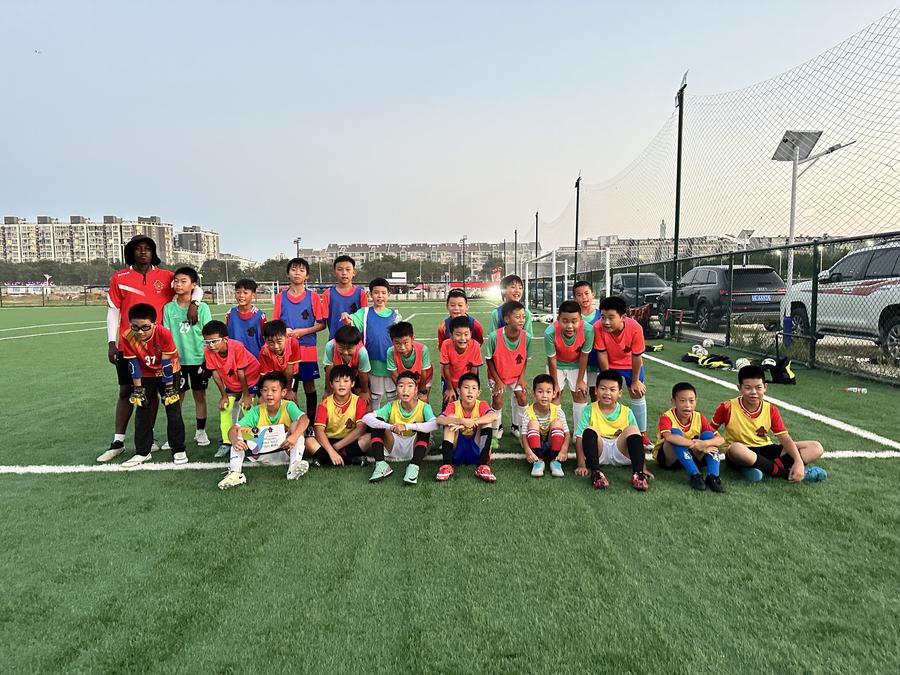
Ruramai Gillian Chakuzira, a Zimbabwean who arrived in east China in 2017 to pursue a bachelor's degree and later transitioned into coaching children at a football club in Beijing in 2022, has dedicated himself to fostering ties between the people of Zimbabwe and China.
by Sportswriter Li Chunyu
BEIJING, Sept. 19 (Xinhua) -- Seven years have not been enough for Ruramai Gillian Chakuzira from Zimbabwe to fully explore the stories that fascinate him in China, including topics like trade, the economy, and, most notably, football.
Chakuzira was already a football coach before coming to China in 2017 to pursue a bachelor's degree at Huzhou University, located in east China's Zhejiang Province, which is well-known for its wholesale and retail industries.
"I traveled to many places around the world, and China is a hub of manufacturing and export businesses. I wanted to be able to get a firsthand understanding here and decided to major in international trade," he said.
Chakuzira always intended to bring what he learned and experienced in China back to his homeland, but now he is eager to stay longer for more inspiring, exciting, and passionate moments.
In 2022, Chakuzira participated in a football match in Beijing, where he met Li Feiyu, a director at Longding Yiya International Football Club. After a brief conversation with Li, Chakuzira decided to coach children at the club.
"It was a very easy decision for me. I saw the boom of football in China, and many kids here want to play football. So, I moved to Beijing," he recalled. "I also wanted to be part of something that brings Chinese football and other football cultures together, and see if we can create something from that."
At just 29 years old, Chakuzira has already played football for 25 years. In Zimbabwe, his coach encouraged him to study the game to better understand it rather than just playing, which helped him grow as both a player and a coach.
"You could have a 60-year-old coach and a 20-year-old coach. Both of them would be able to teach something new, and that is the beauty of it," the Zimbabwean remarked.

Chakuzira's elite team consists of 13 to 15 children, mostly between the ages of 5 and 12. They train three times a week and play one game per week, with each session lasting two hours. Chakuzira particularly enjoys the one-on-one situations, saying, "Every single one of those kids needs to be at a very good level to contribute to the success of the team."
He added, "It's like building a house - you don't use just one concrete slab. You use bricks, and every brick must be strong and firm."
Chakuzira emphasizes "doing simple things correctly," leading the young players through repetitive drills in passing, shooting, and other fundamental skills. "The discipline, consistency, commitment, and all the good characteristics that kids learn from football can be applied to the rest of their lives and help them succeed."
Over the past two years, Chakuzira has enjoyed watching Chinese kids develop from barely being able to kick a football to performing the same moves as the stars they admire. "They never want to leave," Chakuzira said.
These moments remind him of his childhood in Zimbabwe. "I had at least 20 friends within shouting distance. In five minutes, I could gather ten people to play football," he recalled. "But Chinese kids have more structured, busy schedules. It's not easy for them to have a group of friends their age to play with, so I try to make the most of my training sessions to let them enjoy football."
In Zimbabwe, Chakuzira recently set up his own football academy and hired coaches to guide the local children. "Football is not an expensive sport. If you want to play, you just need a place and a ball," he remarked.
The 2010 World Cup in South Africa had a massive impact across the continent, sparking a football craze. Zimbabwe, located just north of South Africa, was swept up in the excitement, but Chakuzira missed out. "I was preparing for important high school exams at the time, but the passion and excitement were everywhere. It showed the love and beauty of football through our eyes. I hope I can witness such a spectacle again in my lifetime."
Chakuzira describes his life in Beijing as a "good" kind of busy. "Everything is accessible if you want it. We have convenient transportation, shopping, and international communities. The environment here makes you a little less homesick."
At 29, Chakuzira is still waiting for the moment when he will decide to return home and share all the knowledge he has gained from his Chinese teachers and coaches from around the world.
"I will continue to build connections between the children in Zimbabwe and China. The cooperation between China and Africa spans various fields, including football and trade," Chakuzira said. "I always hope I can contribute to that." ■












